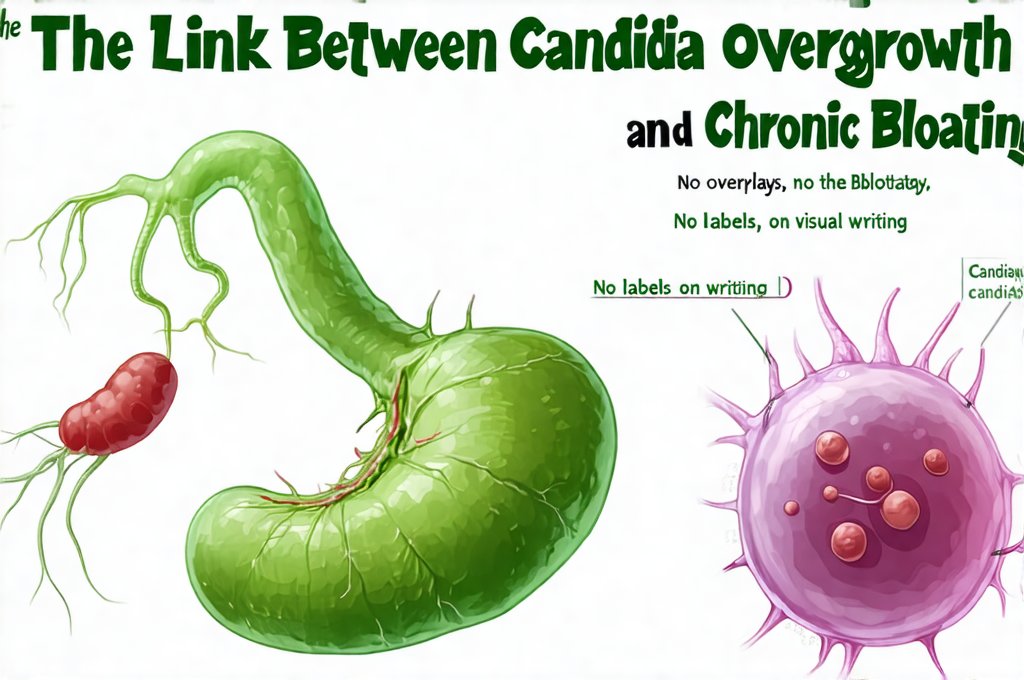Chronic bloating affects millions worldwide, often dismissed as a minor digestive inconvenience. However, for those who experience it regularly, the discomfort can be debilitating, significantly impacting quality of life. It’s frequently attributed to food sensitivities, stress, or simply “being gassy,” but underlying causes are often more complex and require deeper investigation. What many don’t realize is that an imbalance within their gut microbiome – specifically, Candida overgrowth – could be a significant contributing factor. This article will delve into the fascinating, and sometimes frustrating, connection between Candida and chronic bloating, exploring the mechanisms involved, potential symptoms beyond bloating, and proactive steps to support a healthier gut environment. Understanding this link is crucial for taking control of your digestive health and finding lasting relief from persistent discomfort.
The human gut is an incredibly complex ecosystem, teeming with trillions of microorganisms – bacteria, fungi, viruses, and more – collectively known as the microbiome. A healthy microbiome thrives on balance; different species coexisting harmoniously to support digestion, immunity, and overall wellbeing. Candida albicans is a naturally occurring yeast present in most people’s gut. Usually kept in check by beneficial bacteria, it can proliferate excessively when this delicate balance is disrupted. Factors like antibiotic use, high sugar diets, chronic stress, and a weakened immune system can all contribute to Candida overgrowth, tipping the scales and leading to uncomfortable symptoms such as bloating, gas, fatigue, and even brain fog. It’s important to note that while Candida resides in most guts, symptomatic overgrowth is what necessitates attention, and identifying the root causes of imbalance is key. Understanding how gut pain can contribute to this imbalance is a good starting point.
Understanding Candida and its Role in Digestion
Candida isn’t inherently “bad.” As mentioned, it exists naturally within our bodies. Its problem arises when it transitions from a commensal organism – one that lives harmoniously with us – to an opportunistic pathogen. When conditions favor its growth (like those listed above), it can proliferate excessively and begin to impact digestive function in several ways. One key mechanism is the production of ethanol and acetaldehyde during fermentation as Candida breaks down sugars. These byproducts, even in small amounts, can contribute to systemic inflammation and exacerbate gut sensitivity, leading to increased bloating and discomfort. Furthermore, an overgrowth can damage the intestinal lining, increasing intestinal permeability, often referred to as “leaky gut.”
This compromised barrier allows undigested food particles, toxins, and Candida itself to enter the bloodstream, triggering immune responses and further fueling inflammation. The inflammatory cascade then disrupts normal digestive processes, making it harder for the body to break down foods effectively and contributing to gas production and bloating. It’s a vicious cycle: overgrowth leads to leaky gut, which allows more Candida into the system, exacerbating inflammation and perpetuating the imbalance. Recognizing this interplay is vital for understanding why simply eliminating Candida isn’t always enough; addressing the underlying factors that allowed it to flourish in the first place is equally important. It’s also helpful to understand the difference between bloating and other discomforts, like reflux.
Consider these points about Candida’s impact:
– Candida can produce biofilms – protective layers that make it harder for the immune system and antifungal treatments to reach and eliminate it.
– Overgrowth often leads to small intestinal bacterial overgrowth (SIBO), further disrupting digestion and nutrient absorption.
– The type of diet plays a crucial role; high sugar and refined carbohydrate intake directly feeds Candida, promoting its growth.
Identifying Potential Symptoms Beyond Bloating
While bloating is a common hallmark symptom of Candida overgrowth, it’s rarely the only sign. Many individuals experience a cluster of related symptoms that paint a broader picture of gut dysbiosis. These can be subtle and easily dismissed as general fatigue or stress-related issues, making diagnosis challenging. Recognizing these additional signs can help prompt further investigation and potentially lead to earlier intervention. One frequently reported symptom is brain fog, characterized by difficulty concentrating, memory lapses, and a general feeling of mental sluggishness. This is thought to be linked to the inflammatory molecules released during Candida overgrowth crossing the blood-brain barrier.
Beyond cognitive symptoms, digestive complaints often extend beyond bloating to include gas (sometimes excessive), constipation, diarrhea, or alternating between the two. Food sensitivities can also become more pronounced as the gut lining becomes compromised and immune responses are heightened. Individuals might find themselves reacting negatively to foods they previously tolerated well, like gluten, dairy, or soy. Fatigue is another prevalent symptom, often described as persistent and unrefreshing even after adequate sleep. This stems from the energy expenditure required by the body to combat inflammation and deal with the consequences of a dysbiotic gut. Finally, mood swings, anxiety, and even depression can be linked to Candida overgrowth, as the gut microbiome significantly influences neurotransmitter production and brain function.
It’s crucial to remember that these symptoms are not exclusive to Candida; they can indicate many different health conditions. Therefore, seeking professional guidance is essential for accurate diagnosis and appropriate treatment. A comprehensive assessment by a healthcare provider familiar with functional medicine or gut health is highly recommended. Don’t rely solely on self-diagnosis based on symptom lists. If you suspect these symptoms are related to reflux as well, it’s best to consult a doctor.
The Role of Diet in Managing Candida & Bloating
Dietary changes are often the first line of defense when addressing Candida overgrowth and alleviating associated bloating. The goal isn’t necessarily to eliminate all sugars, as that is unrealistic and potentially unsustainable. Instead, it’s about significantly reducing refined sugars, processed foods, and carbohydrates that feed Candida while prioritizing nutrient-dense whole foods that support a healthy gut microbiome. A cornerstone of this approach is the adoption of an anti-Candida diet, which generally involves minimizing or eliminating these food groups:
- Sugar (including honey, maple syrup, agave)
- Refined carbohydrates (white bread, pasta, pastries)
- Alcohol and caffeinated beverages
- Fermented foods (initially – may be reintroduced later under guidance)
- Fruit (limiting to low-glycemic options like berries in moderation)
Simultaneously, focus on incorporating:
– Non-starchy vegetables (leafy greens, broccoli, cauliflower)
– Healthy fats (avocado, olive oil, coconut oil)
– Lean proteins (fish, poultry, beans – if tolerated)
– Fiber-rich foods (to support gut motility and detoxification)
Beyond dietary restrictions, incorporating probiotic-rich foods or supplements can help restore balance to the microbiome. However, it’s important to choose probiotic strains carefully; some strains may exacerbate symptoms in individuals with Candida overgrowth. Working with a healthcare professional to identify appropriate strains is recommended. Furthermore, consider adding prebiotic foods (garlic, onions, asparagus) – these feed beneficial bacteria and help them flourish – but introduce them gradually as they can also cause temporary bloating in sensitive individuals. Dietary changes should be viewed as part of a holistic approach, alongside stress management techniques and lifestyle adjustments to support overall gut health. Understanding the relationship between acid reflux and bloating can help you make informed dietary choices.
Supporting Gut Health Beyond Diet
While dietary modifications are foundational, addressing Candida overgrowth and chronic bloating requires a multifaceted approach that extends beyond food choices. Stress management is paramount, as chronic stress significantly weakens the immune system and disrupts the gut microbiome. Incorporating relaxation techniques such as meditation, yoga, deep breathing exercises, or spending time in nature can help mitigate the negative effects of stress on digestive health. Adequate sleep is also crucial; aim for 7-9 hours of quality sleep per night to allow your body to repair and regenerate.
Another important aspect is addressing potential nutrient deficiencies. Candida overgrowth can impair nutrient absorption, leading to deficiencies in essential vitamins and minerals like vitamin D, B vitamins, and zinc. Consider getting tested for common deficiencies and supplementing under the guidance of a healthcare professional if necessary. Finally, optimizing digestive function through strategies like chewing food thoroughly, staying hydrated, and incorporating digestive enzymes can further support gut health and reduce bloating. Remember that healing the gut is a process; it takes time, consistency, and patience. Sometimes chronic symptoms are linked to throat clearing, which should also be addressed.
It’s vital to reiterate: this information is for educational purposes only and should not be considered medical advice. If you suspect Candida overgrowth or are experiencing chronic bloating, please consult with a qualified healthcare professional for personalized diagnosis and treatment recommendations. They can help determine the underlying cause of your symptoms and develop a tailored plan to support your individual needs. You may also want to explore if burping is a contributing factor.


















